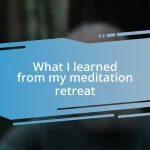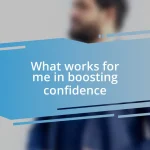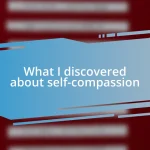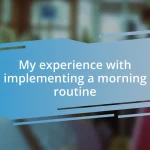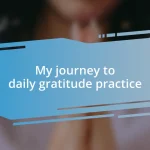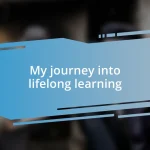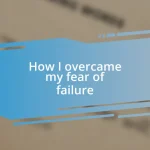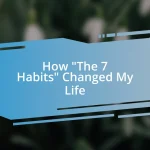Key takeaways:
- Embracing discomfort is essential for personal growth; overcoming fears and setbacks transforms anxiety into confidence and resilience.
- Responsible ownership of emotions and prioritizing values leads to empowered decision-making and deeper connections in relationships.
- Setting boundaries and reframing expectations fosters a mindset of continuous improvement and appreciation for progress over perfection.
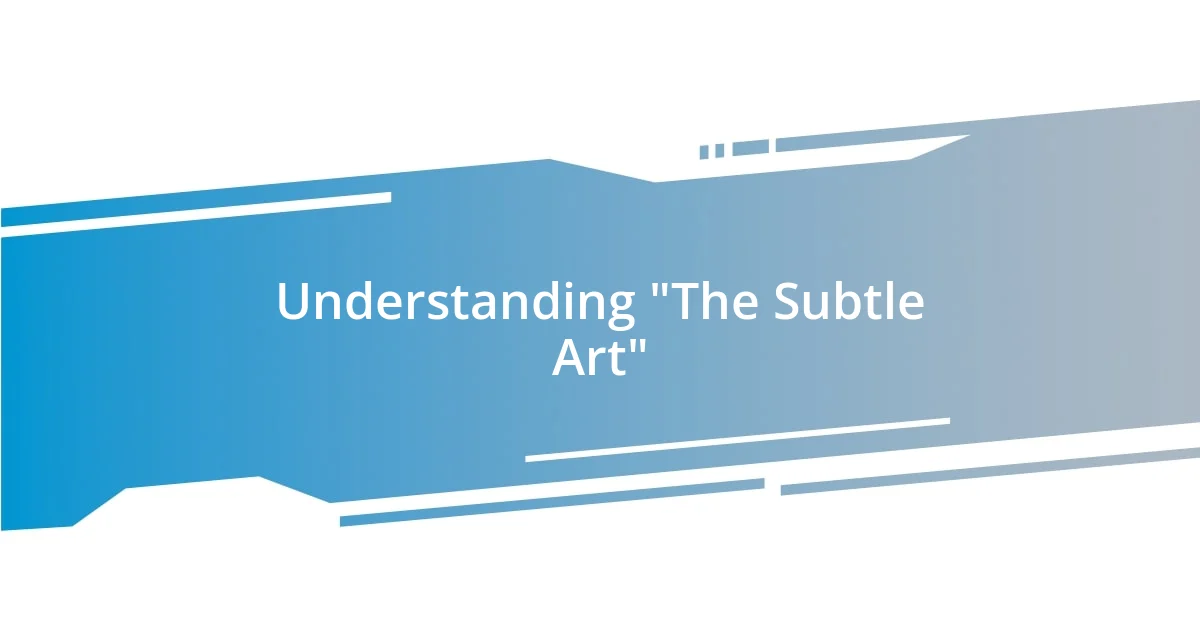
Understanding “The Subtle Art”
Understanding “The Subtle Art” revolves around the idea that life is full of challenges, and accepting this reality is a key to finding peace. I remember when I first encountered Mark Manson’s perspective; it felt like a light bulb moment. I had been trying to be positive all the time, but this book encouraged me to embrace my struggles instead of running from them. Why should we avoid discomfort when it can teach us valuable lessons?
At its core, “The Subtle Art of Not Giving a F*ck” isn’t just about apathy; it’s about prioritizing what truly matters. Manson emphasizes the importance of choosing our values wisely. For instance, I used to invest energy into people’s opinions of me, which drained me emotionally. Realizing that my self-worth shouldn’t hinge on external validation was liberating. How often do we find ourselves caring too much about the insignificant, instead of focusing on our genuine passions?
Additionally, Manson’s candid writing style breaks down complicated philosophies into relatable insights. The raw honesty in his words prompted me to reflect on my own beliefs. I recall discussing the book with friends, and amidst our laughter, serious realizations surfaced. That’s the beauty of this work—it invites dialogue about our struggles, pushing us to dig deeper into our motivations and the reasons behind our choices. What if, instead of avoiding hard truths, we leaned into them for growth?
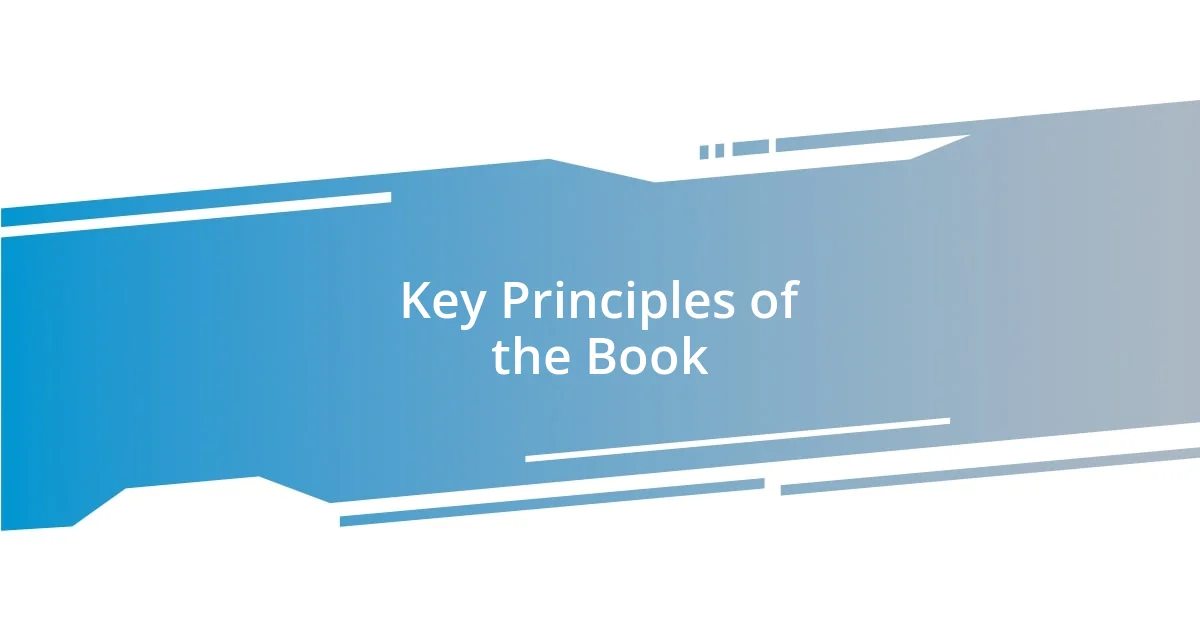
Key Principles of the Book
Key Principles of the Book
One standout principle I found impactful is the belief that pain is an essential part of life. Manson argues that we should stop seeking constant pleasure and instead embrace the discomfort that comes with challenges. I remember a tough period in my career when I faced rejection after rejection. At the time, I was overwhelmed, but looking back, I see those experiences as crucial stepping stones that shaped my resilience and determination.
Here are some key principles from the book that resonated with me:
-
Choose Your Struggles: Focus on what you will devote your energy to instead of trying to avoid negative experiences.
-
Responsibility and Ownership: Accept that you are responsible for how you feel and the choices you make, which empowers personal growth.
-
The Value of Rejection: Embracing rejection can clarify what truly matters to you, helping you to forge stronger convictions.
-
Limited Time and Energy: Acknowledge that you can’t care about everything, so prioritize what genuinely adds value to your life.
-
Death Awareness: Recognizing our mortality can motivate us to live more meaningfully, pushing us to make choices aligned with our values.
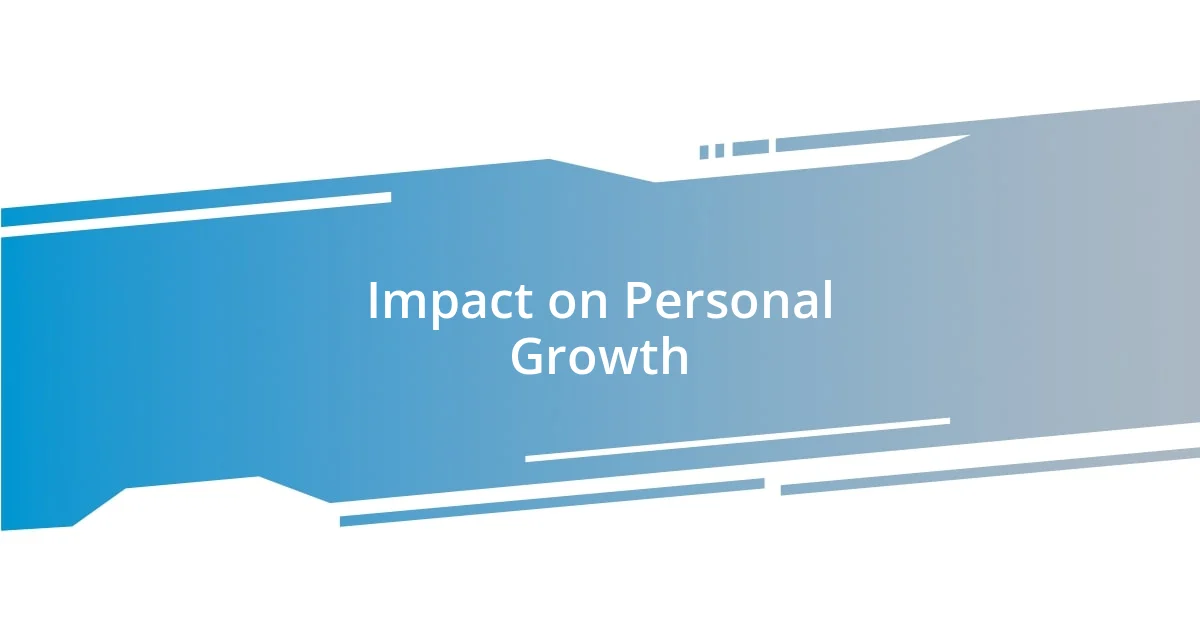
Impact on Personal Growth
I’ve experienced firsthand the transformative power of embracing discomfort. Once, I was terrified of public speaking. It held me back from opportunities I now realize I would have truly enjoyed. When I started applying Manson’s message about facing fears instead of avoiding them, I forced myself to volunteer for presentations. That initial anxiety gradually morphed into confidence, allowing me to not only express my ideas but also connect with a wider audience. Isn’t it fascinating how confronting a fear can lead to newfound strengths?
The impact on my personal growth didn’t stop at just tackling fears; it reshaped how I approach setbacks. I remember a time when a project I had poured my heart into didn’t go as planned. My instinct was to retreat and hide from criticism. However, I recalled Manson’s principles. Instead of wallowing in disappointment, I scrutinized what went wrong. This reflection revealed glaring areas for improvement, ultimately enhancing my skills. Each setback became a lesson, illuminating the path to my development. Have you faced a setback that turned out to be a crucial learning moment?
This journey towards personal growth cultivated a deep appreciation for vulnerability. I’ll never forget the day I opened up to my closest friends about my failures and fears. Initially, I was worried they might judge me. Instead, I found camaraderie and support. By sharing my struggles, I not only lightened my emotional load but also inspired others to do the same. This communal experience underscored Manson’s idea that real connections are built through honesty and authenticity. Isn’t it incredible how vulnerability can foster deeper relationships?
| Aspect | My Experience |
|---|---|
| Embracing Discomfort | Faced fears of public speaking; transformed anxiety into confidence. |
| Learning from Setbacks | Turned a project failure into a valuable lesson for growth. |
| The Power of Vulnerability | Opened up to friends, built deeper connections through shared struggles. |
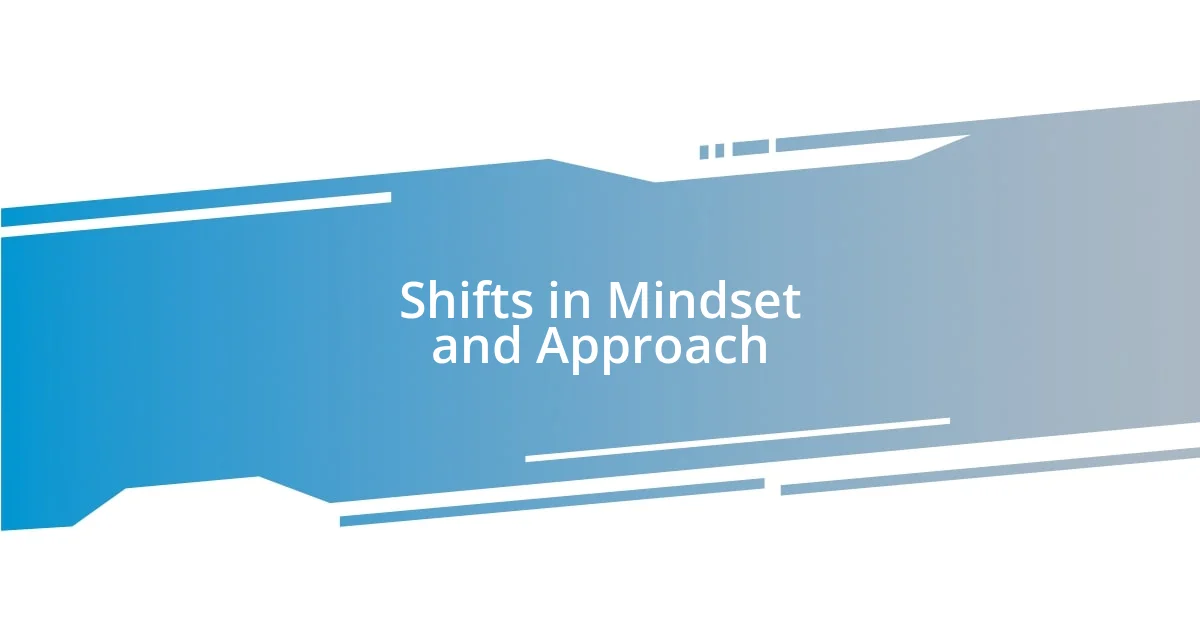
Shifts in Mindset and Approach
Reflecting on my mindset shift, I’ve realized that accepting responsibility for my feelings changed everything. I used to blame external factors for my dissatisfaction, often feeling like a victim of my circumstances. Once I embraced the concept that my response to challenges is my choice, I started to reclaim my power. This realization transformed not only how I viewed problems but also how I tackled them head-on. Have you ever felt empowered by taking ownership of your emotions?
Another significant shift occurred when I began to prioritize what truly matters in my life. In the past, I said yes to nearly every commitment, fearing I’d miss out. But as I internalized the idea of limited time and energy, I grew more selective. For instance, when I opted out of a social event that I didn’t genuinely enjoy, I felt a weight lift off my shoulders. I was no longer spread too thin, and that allowed me to invest my time in activities that brought me joy and fulfillment. Doesn’t it feel refreshing to let go of what doesn’t serve you?
Additionally, embracing rejection as a valuable lesson enhanced my resilience. A memorable moment in my career was being turned down for a role I had set my heart on. Instead of letting it deter me, I shifted my perspective to see it as feedback rather than a failure. This experience ignited a motivation to refine my skills and seek opportunities that truly aligned with my strengths. The next time I was faced with a rejection, I was calmer and more analytical, asking myself, “What can I learn from this?” That transformation opened doors I hadn’t considered before. How has your perspective on rejection influenced your journey?
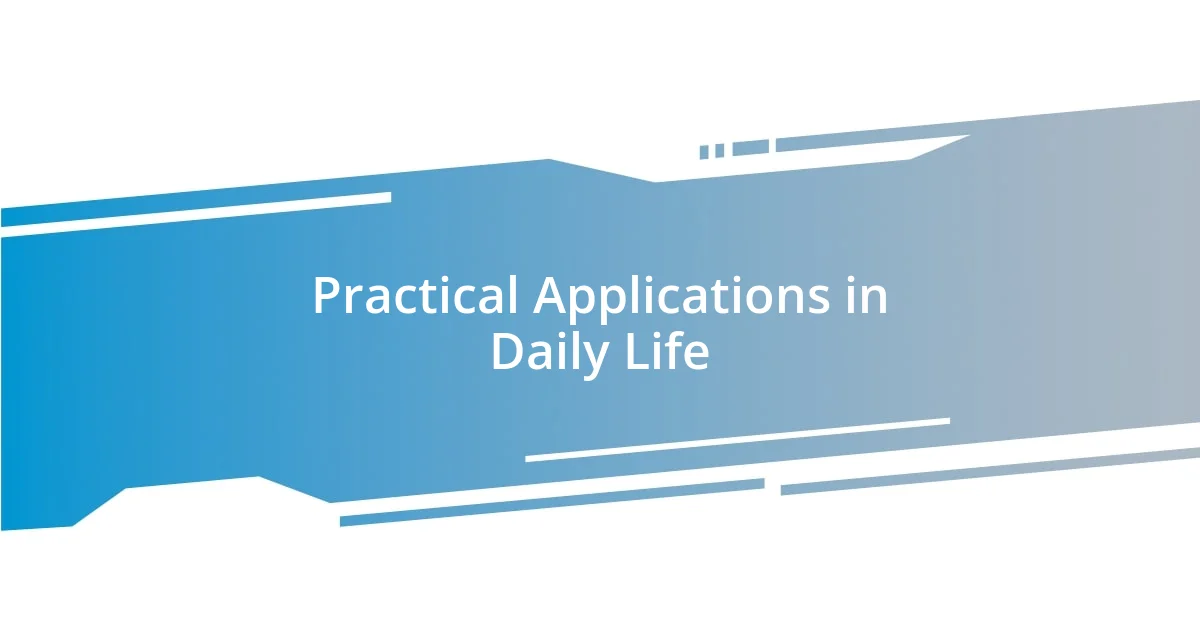
Practical Applications in Daily Life
I’ve found that incorporating the principles from Manson’s work into my daily routines has truly shifted my perspective. For example, I began practicing the art of prioritizing my tasks by asking myself, “What genuinely matters today?” This simple question led me to let go of my tendency to over-schedule, which had previously drained my energy. Now, when I focus on a few meaningful activities, I find I can engage more deeply and really enjoy what I’m doing. Have you tried prioritizing your day this way?
One practical application has been my approach to feedback. I used to shy away from constructive criticism, viewing it as a personal attack. Yet, I learned to reframe this feedback as an opportunity for growth. The last time I received critical input from a peer, instead of getting defensive, I asked clarifying questions. This not only helped me understand their perspective but also opened the door for a productive conversation. Realizing that insights from others can enhance my skills transformed those moments from anxiety to invaluable learning experiences. Isn’t it liberating to see feedback as a catalyst for improvement?
Moreover, I’ve started embracing the idea of saying “no” more often. At first, it felt selfish, but I quickly discovered it doesn’t have to be. Reflecting on my values, I’ve realized that every commitment takes my precious time and energy. Once, I declined an invitation to a gathering I had no interest in. Surprisingly, I felt a rush of relief afterward; it was a reminder that my time is a resource I should spend wisely. Have you experienced the freedom that comes with saying no to things that don’t align with your priorities?
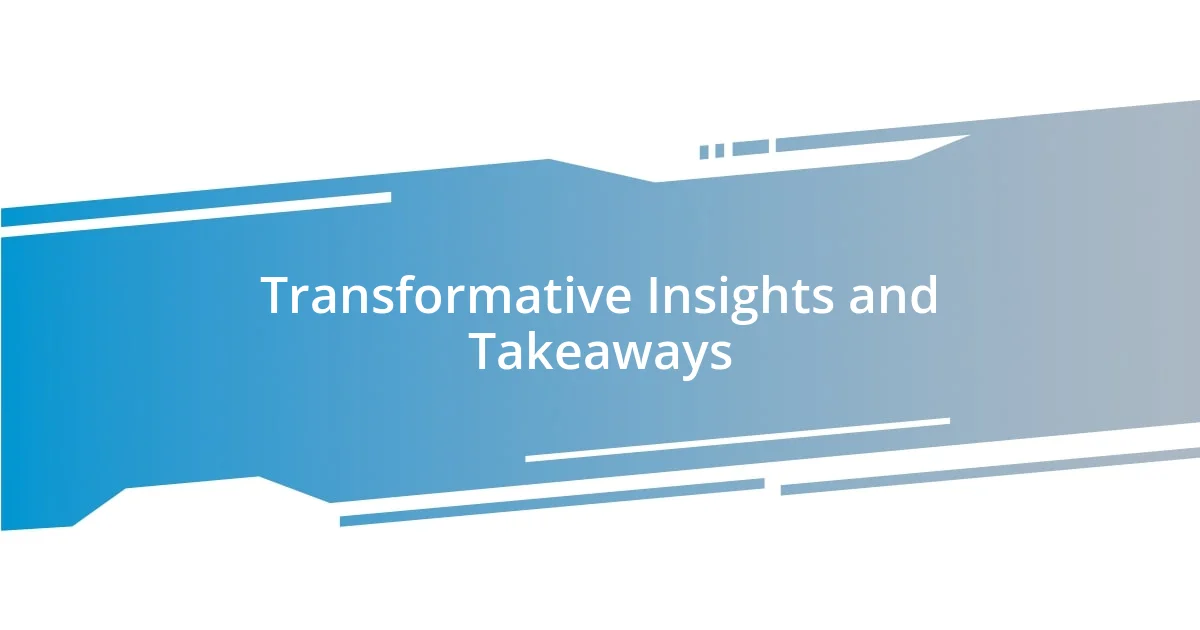
Transformative Insights and Takeaways
One transformative insight I’ve gained is the power of setting boundaries. Before embracing this idea, I often felt overwhelmed by others’ requests and expectations. I recall a time when my friend asked for help with a project that, while important to him, did nothing for my own goals. Saying no was hard—there was a fear of disappointing him. But after I did, an unexpected sense of liberation washed over me. Have you ever felt a weight lift after prioritizing your needs?
Another key takeaway relates to the idea of embracing discomfort. I used to shy away from situations that made me uneasy, thinking they were something to avoid. However, I discovered that stepping into discomfort often fosters growth. For instance, when I initially signed up for a public speaking class, I felt a rush of anxiety. But through the experience, I not only developed my communication skills but also gained confidence. How has stepping out of your comfort zone led you to new opportunities?
Lastly, I’ve learned to reframe my expectations. Instead of seeking perfection in every endeavor, I now appreciate the beauty in progress. I remember a time I spent weeks crafting a presentation, pouring my heart into every detail. When the big day arrived, things didn’t go as planned. Instead of being disheartened, I focused on the progress I made rather than fixating on what didn’t go perfectly. This shift has allowed me to celebrate small victories. What little achievements have you overlooked on your path to success?
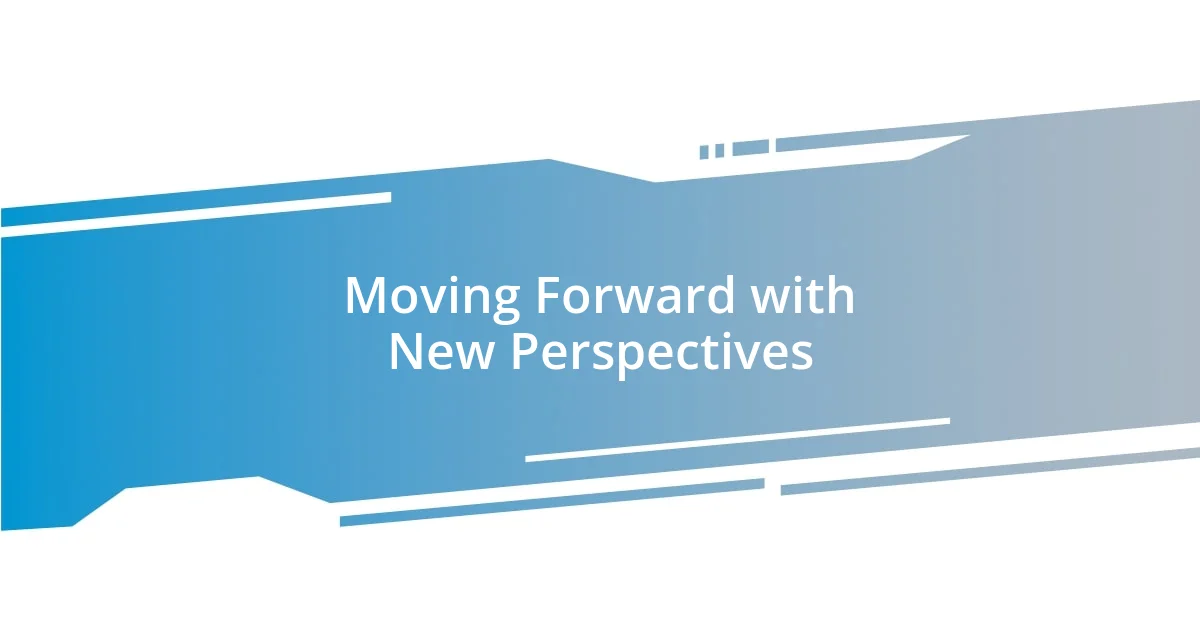
Moving Forward with New Perspectives
Shifting my perspective has been a gradual but rewarding journey. I vividly remember a weekend when a spontaneous road trip, instead of a meticulously planned event, turned into one of the most memorable moments of my life. I realized that being open to unplanned experiences allowed joy and spontaneity to flourish, which is a refreshing contrast to my previously structured life. Have you ever experienced the thrill of embracing the unexpected?
Another significant change involves my approach to relationships. I used to see them as obligations—appointments to keep and interactions to schedule. However, with a new perspective, I now treasure the moments of genuine connection. Just last month, I met up with an old friend for coffee, and instead of rushing through our conversation, I allowed myself to be fully present. I felt the warmth of our shared history and the power of simply enjoying the moment, which deepened our bond. Isn’t it remarkable how a shift in focus can transform interactions into meaningful experiences?
Finally, I’ve come to appreciate the necessity of reflection. I used to barrel through tasks without considering how they aligned with my overall goals. Now, I’ve incorporated weekly check-ins where I reflect on my progress. Just recently, I used this time to evaluate a project I initially thought was a failure. In doing so, I uncovered valuable lessons that can guide my future efforts. This practice not only clarifies my path but cultivates a mindset of continuous growth. How do you reflect on your journey, and what insights does it bring you?
